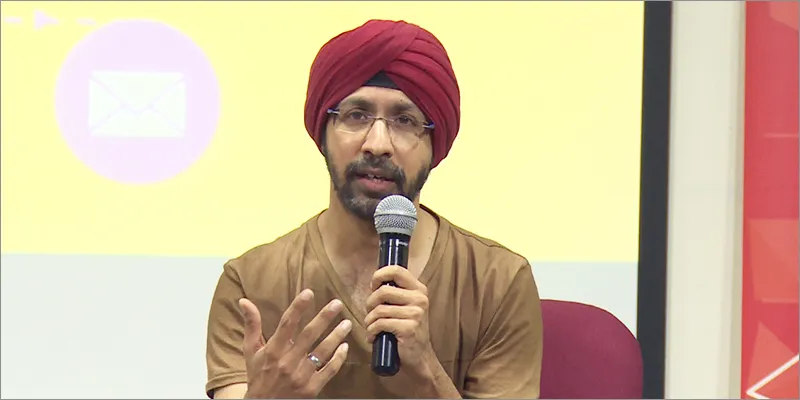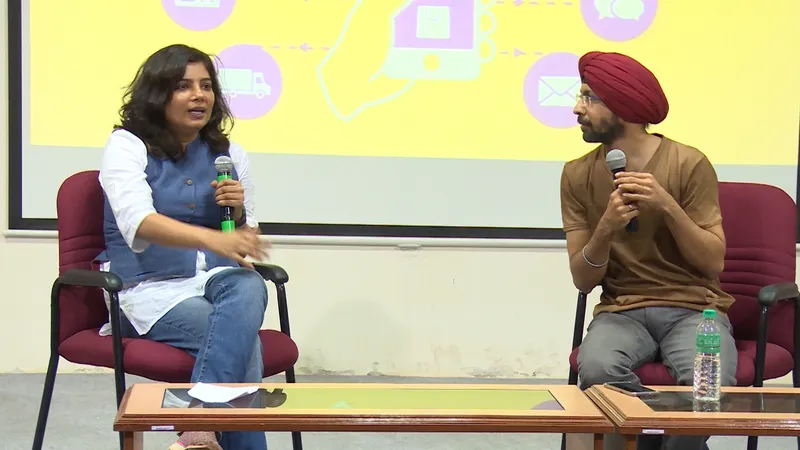‘India has maniacal energy’, says Punit Soni
With a gigantic $3.15 billion funding raised in 12 rounds from 16 investors since its inception in 2007, Flipkart, now valued at $15 billion, no doubt has had an impact like no other in India’s e-commerce boom. The first big news from Flipkart this year was the hiring of Punit Soni, Motorola’s former Vice President and Google Product Management Executive, as its new Chief Product Officer in March. At a fire side chat with Shradha Sharma, Founder of YourStory, as part of ‘The Marketplace 2015’ event on Friday, Punit shared some deep and useful insights into building and improving technology businesses to an audience that comprised more than 100 startups.

Online retail in India is expected to grow to over $60 billion by 2020, with the biggest drivers being e-marketplaces. Punit said that the next big opportunity in business is not just from e-commerce but commerce. “Flipkart is half of e-commerce in India, which is 1% of commerce,” he said. He elaborated on the substantial issue that online commerce faces – penetration into tier-II, tier-III markets. “In a way, India has 50–60 countries. There is so much diversity among the consumers that there could be different models in each state, and each state can have its own marketplace leader,” he said. However, the biggest challenge revolves around the customers’ trust, safety, and preventing frauds. “Inefficiencies also come with lack of infrastructure,” he added.
To Shradha’s question on which market has the next unicorn opportunity, Punit gave a surprising answer – “Wedding space is one in which events are never going to stop. Opportunities are high for event-based startups,” he said. He also said that there are many problems that existing markeplaces and their vendors face. For instance, packaging is a big issue for vendors – this could be a big opportunity for an entrepreneur. Here are some of the top points from the discussion:
Second hand is the new trend
One of the six startups that were selected as The Marketplace of 2015 at the event was Zapyle, a peer-to-peer marketplace for pre-owned fashion. Its Founder Rashi Menda had stated that the potential market size of sellers is worth $2.61 billion. With the likes of Olx and Quikr making it easier to get pre-owned goods at cheaper prices, the taboo of the market has been visibly lifted off.
On the future of this market, Punit said: “C2C marketplaces provide a platform to connect people. The more you get into a place where you have less control on supply and its quality, you need much more substantially algorithm-regulated platforms that can figure out how to keep both parties safe.”
How important is mobile?
There were rumours that Flipkart would go app-only. However, that has not happened and in fact, a few weeks ago, Flipkart relaunched its mobile site – Flipkart Lite. Punit said that for Fipkart and for other Internet businesses, the challenge is solving for the much bigger mobile-only market that are coming online. He said India has approximately 20 million laptop users. “How will you serve the millions who never use a laptop or desktop, who have only a low-cost android phone with low memory and 2G with poor signal? Your app has to be functional on that.” He claims that Flipkart Lite and is only 10kb in size, is 99% similar to the native app that is 25mb in size.
For the younger startups, he said, “Initially, be more specific about the demography you want to serve, which category you are getting into. A generic approach might make it difficult.”
One of the queries from the audience was on the difficulty of choosing a product on a small mobile screen for many customers. Punit said the Flipkart website will be up and running as long as people are buying through it. He said mobile thinking was a mindset. He also said that the teams in Flipkart are expected to solve for mobile as that is the tougher challenge and the bigger opportunity.

Incredible India
After 20 years in the Bay Area, it was not the cultural nuances that surprised him in India. “Bay Area was never short of intellectual fervour and interesting ideas. But India is a young country – it shows in ideas and thought processes; there is maniacal energy here. However, there is a lot of maturing and learning yet to happen,” he said.
On a query about the possibilities of vernacular apps, Punit said that the early adopters of this strategy have an advantage. “Newer technologies tend to focus on English. But after a point, vernacular is important to scale to the next level – in tier II and tier III cities,” he said. However, he added, early-stage startups better focus on English unless they are focussing on specific demographics.
Going social
Yet another question from the audience was the importance of ‘social’ for marketplaces. Punit said this is an important element of online shopping. Offline shopping is primarily a social exercise with people going out shopping in groups and getting opinions from their friends or family before making the actual purchase. On the stationary desktop or laptop, getting the social part was not easy. Mobile has changed that as it is a very personal device. Adding the social element makes online retail as close to the natural shopping experience.
Educating vendors
One of the main problems facing marketplaces is educating the sellers on how to do business online. Many of them have poor technical knowledge, but Punit said that generic as well as special classes can help them. He said marketplaces should remember that sellers are as important as customers. “Sellers are users too; you should understand what motivates and troubles them. Very rarely do we spend time on it; only consumers get our attention. But we should sit down and ask the sellers what they need,” he said.







